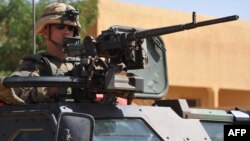PARIS —
Africa figures prominently in France's newly outlined military defense strategy - and experts say the Mali offensive may serve as a blueprint for future operations.
Outlined by Defense Minister Jean-Yves Le Drian, the newly released review of France's national security and defense policy reflects the challenges of dealing with new military threats with less money.
France is grappling with tough economic times. But while the Defense Ministry will still shed tens of thousands of jobs, the Socialist government has decided to freeze the defense budget, rather than cut it.
At a press conference, Le Drian said France needed to respond to rising new threats against adversaries with sophisticated technology and means. The strategic review targets Africa - in particular, North Africa and the Sahel region - as a key geographic priority. At least four French bases in Africa will be maintained.
Christophe Guilloteau, a deputy from the opposition UMP party and a member of the commission that drafted the review, says France's Operation Serval in Mali was key in ensuring Africa would remain a defense priority for France.
In an interview on Radio France International, Guilloteau said those who believed France should further disengage itself from Africa changed their minds with this year's French offensive in Mali. Had France not already pre-positioned its forces in nearby countries like Chad and Ivory Coast, he said, Paris could not have responded as rapidly as it did.
Associate Africa Program fellow at London-based think-tank Chatham House, Paul Melly, believes the Mali operation may serve as a model for future French operations as well.
"What France wants to do is to have Africa take the political leadership of security in the continent, which France is willing to provide the high-tech advanced equipment - heavy, logistical backup if you like - that African countries do not necessarily have themselves. And Mali, in a sense, will be a model for this, because African troops will take over the vast bulk of the peacekeeping while France maintains a small force of about 1,000 troops for emergencies... If this model works, it is one that could be extended more widely. So Mali is something of a test bed," he said.
While many considered France's offensive in Mali a success, critics - notably opposition lawmakers - note there is no clear exit strategy. Thomas Klau, head of the Paris office of the European Council on Foreign Relations, also questions whether it can be easily replicated elsewhere.
The defense review also pushes for a more integrated European defense program. But Klau says that means convincing skeptics like Germany about the importance of intervening in Africa.
"There is a slightly irrational trauma in Berlin that's precisely what France, and to some extent the UK want to do - to use Germany military means and financial resources to engage in post-colonial policy making in Africa. I think the... fears are misplaced to a significant extent but it falls on France and, to the lesser degree the UK to reassure Berlin," he said.
Melly says French President Francois Hollande has clearly stated that France's relations with Africa have turned the page; Paris now sees Africa as a partner. Mali is a case in point, Melly says - France only intervened at the demand of the Malian government. He says Mali has left its mark in other ways.
"The success of the Mali operation has boosted the political self-confidence of the French military in showing that France can do a demanding, high-tech, long-distant operation if it's well-targeted and in a part of the world that France knows well and for which its troops are trained. So it's a case of France doing what it's good at... where it has a strength and can do affordably," he said.
And that, Melli says, appears to be at the heart of France's new defense strategy.




